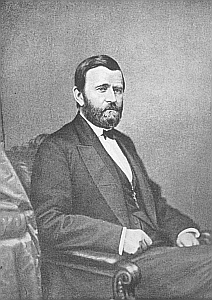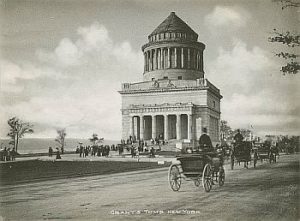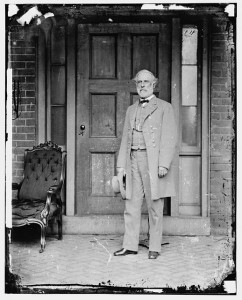Ulysses S. Grant was born on April 27, 1822 at Point Pleasant, Ohio. Point Pleasant is a community on the Ohio River east of Cincinnati. Grant’s father Jesse, was a tanner.
Hiram Ulysses Grant – Ulysses S. Grant
When a young Ulysses Grant arrived at West Point, he found his appointment was in the name of “Ulysses S. Grant,” but Grant’s parents named him “Hiram Ulysses Grant.” Grant never bothered to change the clerical error to his proper name.Perhaps Grant did not wish to have his real name initials of “HUG” adapted as a nickname for him by his fellow West Pointers. Besides, “U. S. Grant” worked better. Later, Grant was called “Unconditional Surrender Grant” after Confederate Simon Boliver Buckner surrendered Fort Donelson to him.
Ely Samuel Parker was a Seneca Indian, a Union officer, and the son of a famous Seneca chief. He studied law, but was refused admission to the bar because he was not a citizen. Later, Parker graduated from Rensselaer as an engineer. Ely Parker was working in Galena, Illinois in 1857, and he became the friend of a store clerk whose name was Sam Grant. Sam Grant was Ulysses S. Grant, and during the Civil War Ely Parker became General Grant’s military secretary. Ely Parker had exceptional penmanship, he transcribed the official copies of the surrender documents when Robert E. Lee surrendered to Grant at Appomattox Court House.
Doggone it! By lightning!
Grant never swore. His explanation for this:
“Well, somehow or another, I never learned to swear, when a boy I seemed to have an aversion to it, and when I became a man I saw the folly of it. I have always noticed, too, that swearing helps to rouse a man’s anger; and when a man flies into a passion his adversary who keeps cool always gets the better of him. In fact, I could never see the use of swearing. I think it is the case with many people who swear excessively that it is mere habit, and that they do not mean to be profane; but, to say the least, it is a great waste of time.”
In an army full of magnificent swearers, Grant’s strongest exclamations were: “doggone it” or “by lightning.”
Army Service In California
Ulysses S. Grant served with generals Zachary Taylor and Winfield Scott during the Mexican War. After the Mexican War, Ulysses S. Grant was stationed without his wife and children in California. This was very difficult time for him because Grant’s family was the center of his life. Without his wife and children near him, Ulysses S.Grant was an unhappy and sad man. Grant was lonely and bored in California and took to excessive drinking. It should be known that although Grant did drink excessively at times, never did his drinking interfere with his duties in the Civil War. The debate over whether or not Grant was an alcoholic continues to this day. We can be sure that Ulysses S. Grant loved smoking cigars. Eventually, Grant resigned his commission in 1854. The United States Secretary of War accepted Grant’s resignation, and in one of the strange quirks of Civil War history that Secretary of War was Jefferson Davis, the future president of the Confederate States of America.
President Ulysses S. Grant
After the Civil War, Ulysses S. Grant became an author, Secretary of War under President Johnson, and was elected President of the United States in 1868, he served two terms.
Personal Memoirs of U. S. Grant
Ulysses S. Grant finished his two-volume autobiography, Personal Memoirs of U. S. Grant, only days before he died of throat cancer in 1885. Mark Twain’s firm published Grant’s memoirs and 300,000 copies were sold, earning $450,000 for Grant’s widow, Julia. Grant’s autobiography is considered as one of the best autobiographies written in the English language.


